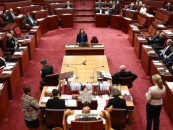Treasurer Scott Morrison has asked parliamentarians to partner the government in its efforts to boost the incomes of Australians. Where do I sign?
We find out whether we are in recession on March 1, 2017, and there are only seven sitting days in the Senate prior to this. What we need is seven days of action; a comprehensive growth plan to bolster confidence in the face of the possible bad news.
On the first day we should pass the government’s plan to reduce the company tax rate for all businesses to 25 per cent over a decade. This was the central policy of its campaign at the election, which it won. Half the benefit goes to Australian workers through more jobs and higher wages, and it would still leave tax revenue growing faster than the incomes of Australians.
On the second day the Senate should pass the government’s environmental approval plans. This involves removing duplication in federal and state environmental approval processes, and preventing busybodies who are unaffected by a new development from challenging the development’s environmental approval. This would signal to entrepreneurs that they are more likely to receive development approval, it will cost them less, and the wait for approval will be shorter. There is no better way to protect the long-term employment of thousands of forestry, mining and tourism workers, and to signal that Australia is truly open for business.
On the third day the Senate should pass the government’s plan to ensure that young people who are able to work are denied welfare for the first month after leaving school. We need to encourage young unemployed Australians to move to where jobs are available, even if the jobs, like stacking shelves and picking fruit, aren’t glamorous.
On the fourth day of parliament the Senate should pass the government’s plan to shave a slice off Australia’s ballooning welfare spend. The plan involves reduced taxpayer‑funded paid parental leave if your employer is already providing paid leave; reduced eligibility for the age pension if you are overseas; reduced welfare if you start earning money; and reduced end-of-year bonuses for families on welfare.
Such budget repair would help Australia keep our AAA credit rating, which would help keep interest rates low to promote business investment. It would also help our export industries, as budget repair delivers a more competitive exchange rate (as a recent Treasury report explains).
Reshape industrial relations
On the fifth day the Senate should pass the government’s industrial relations plans rejected in the previous parliament. This includes reducing the costs of baseless unfair dismissal claims, removing union right‑of‑entry to workplaces with no union members, and allowing “individual flexibility agreements” so that employers aren’t stuck in a hiring straitjacket.
The government’s industrial relations plans also include shipping reforms to allow more foreign ships to compete for freight jobs along Australia’s coast, and to allow Australian ships to pay lower wages when bidding for work in international waters. These changes would reduce the costs to Australian consumers and businesses of traded goods, and promote the employment of more Australians.
On the sixth day the Senate should pass a reduction in the renewable energy target. The government reduced it to 33,000 gigawatt hours in the last parliament, and given the different make-up of the crossbench in this parliament (bye-bye Glenn Lazarus), the prospects for a further reduction are good. The current target is nowhere near achievable and a reduction will be important to save Australian businesses, particularly our remaining manufacturers, from dramatic electricity price increases in coming years.
The seventh day of parliament should be a day of rest. This should be the day that the government announces it is dropping its plans to squeeze more tax out of the cash economy, to increase child care subsidies for wealthy parents, and to introduce an “effects test” to shield small business from competition. Such announcements would themselves be pro-growth.
Seven days of action at the start of the new parliamentary year, even if only some of these pro-growth policies pass the Senate, would help ensure Australia was ready on the first of March if we find out we’ve been in recession. And at least we’ll have already made a determined effort to turn the economy around.
It’s a partnership opportunity the government shouldn’t miss.
David Leyonhjelm is a Senator for the Liberal Democrats
First published in Australian Financial Review.









